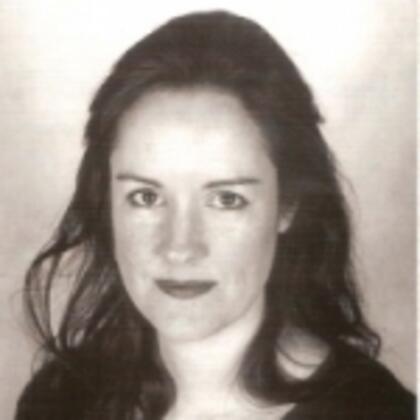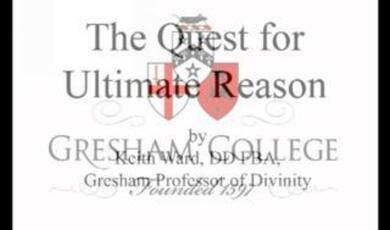Blinding Darkness
Share
- Details
- Text
- Audio
- Downloads
- Extra Reading
The Isa Upanisad tells us: 'Into blinding darkness enter those who worship ignorance and those who delight in knowledge enter into still greater darkness.' The Jaina notion of perspectivism maintains that, on any given matter, there is not one truth but rather at least seven different points of view. Deep investigation of inter-faith questions raises the problem of religious 'knowledge' and of the interpretation of human religious experience. But the diversity of religious claims and testimonies also raises questions of multiple perspectives; of relativism or its alternatives.
Download Text
Blinding Darkness
Professor Gwen Griffith-Dickson
‘Into blinding darkness enter those who worship ignorance and those who delight in knowledge enter into still greater darkness.’ [Isa Upanishad 9]
Philosophers have given us a variety of answers to how we know things. We can know things because we perceive them through the senses; we come to know things through experience. Or we can attain some kinds of knowledge by the use of reason and logic.
But is religious knowing like other kinds of knowing? Many have thought that knowledge of the divine or Brahman cannot be the same as knowledge of things in the world or mathematical knowledge for example. How can we know something which we can’t experience with our senses? How can we know something for which we can provide no concrete, physical, factual proof or evidence? From another perspective, the very notion of knowing something which transcends our human faculties of knowledge, reason or logic is contradictory, unintelligible, and impossible.
There are certainly philosophers within many religious traditions who have believed that rational insight can yield religious truths; that reasoned reflection can demonstrate that this or that religious claim must be the case. Or perhaps religious knowledge comes through experience, but a kind of experience that is wider than merely sensory: ‘religious’ or ‘spiritual.’ experiences. Alternatively, since ancient times, thinkers have suggested that knowledge of the divine might be inborn or indwelling. Knowledge of spiritual truth might somehow be within ourselves, and the way to find it out is to look within. Or knowledge might come through practice - through prayer or meditation, or specific rituals, we attain to religious insight. Finally, some of the world’s religions believe in revelation. This might take the form of specific communications or manifestations from God through specified individuals. Or it could be said to be revealed in sacred scriptures, which have a different status from the writings of theologians or philosophers.
Much of this seems to me to rest on your fundamental model of what knowledge is. What is knowing the divine like? In much of the discussion of religious experience that we find in philosophy of religion today, there is tacit presupposition that knowing God is like a kind of perception. For example, the atheist philosopher Michael Martin argues that not seeing a chair is good evidence for there being no chair in the room, so failing to experience God is a good argument for the non-existence of God . (1) I think this would be a perfectly elegant argument against the existence of God, but only so long as having a relationship with God is just like looking at a chair. Unfortunately when other philosophers of religion want to undermine this argument, they move in to say how perceiving God might be different from perceiving a chair. What goes largely unchallenged is the fundamental assumption that knowledge of God is in some way a question of perception, of perceiving an object - albeit a Divine object. We do not treat interpersonal knowledge as if it were just a variant of sense perception. If I have difficulties in getting to know or understand someone else, those difficulties are not found in wondering whether I am deluded in thinking I am experiencing his presence. Why should we view knowledge of the divine in this way?
The concepts of truth and knowledge are closely related, and so whatever I say tonight about knowledge should take into account what I said last time about truth. Last week I made some suggestions about how we think about truth in a religious context. Principle among these was the suggestion that truth is best seen as a network of right relationships. If it is fruitful to see truth as a relationship, perhaps we should also view knowledge of the Real as a relationship. Rather than thinking it is a particularly difficult case of perceiving something, or arguing about its existence, we should interpret its challenges as those similar to the challenges of interpersonal knowledge. (This means that even if you are not religious or a believer, my hunch is that some of this thinking will also apply to the mystery of knowing another human being fully and deeply.)
I also suggested last week that truth should be seen as plural, even at times courting contradiction and error. There is an interesting concept in Jain philosophy, which is sometimes known in English as perspectivism. They call it anekantavada. All predications, descriptions, or statements of what is the case are from a point-of-view. And for every situation there are always seven possible standpoints. No absolute affirmation or negation is possible about anything, for the nature of things is too complex to be exhausted in a single definite proposition. Although on the face of it these different points of view look like contradictions, the Jain thinker feels this misses the point. Contradictions can only be avoided when statements are understood as reflecting different perspectives, and thus bringing out a different aspect of the truth. This has interesting potential as a starting-point for reflection on pluralism in knowledge.
Finally, I said that we should include an element of forward dynamism in our notion of truth; that what we possess are approximations to the truth that are never final but always evolving, hopefully in an ever closer relationship to the Real. This is well expressed in a quotation from Johann Georg Hamann’s letter, which I quoted last time:
‘Yes, daily at home I have the experience that one must always contradict oneself from two viewpoints, and never can agree, and that it is impossible to change these viewpoints into the other without doing the greatest violence to them. Our knowledge is piecemeal-’ (2)
Philosopher Michael Williams suggests:
‘Instead of the picture of knowledge as an edifice resting on [1Xed and immutable foundations, I want to offer the picture of human knowledge as an evolving social phenomenon. At any time, we will have a solid core of unquestioned perceptual reports, and the like, against which more marginal and less certain beliefs can be checked. But even this solid core may come in for drastic revision in the interests of deeper insight or theoretical advance. Any belief can be questioned, though not all at once. In this way, the pursuit of empirical knowledge can be seen as a rational pursuit not because empirical knowledge rests on a foundation but because... it is a self-correcting enterprise.’(3)
Perhaps there is a way of picturing knowledge not as a list of correct statements; but as a changing body of truths in which different voices and perspectives are heard. The fact that this continually throws up contradictions and conflicts is part of the process, not a sign of failure.
As in the first lecture, I will take an image from my homeland of Hawai’i to make these suggestions more concrete. Hawai’ian thought has a concept of lokahi, which is a balance of contrasting elements; unity, harmony. It may be like the European alchemists’ ‘Principle of the Union of Opposites’, or insights expressed in the yin-yang symbol. However, it can involve more elements than just two - a balanced and healthy ecosystem would be a good example. A Hawai’ian example of lokahi is found in the volcanic activity that created the Hawai’ian islands. When volcanic lava flows, it destroys. It burns and consumes. And yet a famous Hawai’ian religious chant describes this as ‘making the land beautiful’. For when lava breaks down, when its fire, its dryness, its barrenness is balanced with water, it makes a tremendously fertile soil, and the plants begin to grow and bring life to the renewed earth. For Hawaiians, the activity of the volcano was the action of the goddess Pele, in all her destructive power; but also the beginning of new creation and ever-increasing beauty. This conflicting yet complementary harmony of destruction and creation, death and life, plants, animals, wind and rain is lokahi.
Tonight I want to suggest some ways of thinking about knowledge that go together with the ways of thinking about truth that I suggested last time. For the way I want to think about both truth and knowledge could be expressed in Hawai’ian terms as lokahi, as a body of many relationships.
The idea of knowledge and truth as a lokahi of relationships is for me a much more satisfactory way of dealing with the serious conflicts in beliefs and ethics that do arise between cultures, world-views, and religions than ‘relativism’ is. A ‘lokahi of relationships’ succeeds in recognising the inescapable role that our own culture and beliefs play in shaping our viewpoints, and takes seriously both the differences that exist between people, and also the difficulties in understanding them. But it does make that understanding possible, which many varieties of relativism do not. Above all, it brings all these different interpretations or different perspectives into relation with one another, which is the only way theycan become this ‘evolving social phenomenon’ or ‘self-correcting enterprise’ that Michael Williams speaks of.
Thinking about knowledge as a relationship seems to be seriously neglected by mainstream Western philosophers. One of the few to have placed knowledge firmly in the context of relationship is Hamann. For Hamann, knowledge as a whole is inseparable from self- knowledge, and self-knowledge is inseparable from knowledge of the other: ‘In order to make easier the knowledge of our self, my own self is visible as in a mirror in every neighbour. As the image of my face is reflected in water, so my self is reflected in every neighbour. That this self may be as dear to me as my own, Providence has sought to unite as many advantages and amenities in human society as possible. God and my neighbour are therefore a part of my self-knowledge, my self-love.’ (4) In fact for Hamann, all forms of knowledge, learning and development; require the help of another, whether we are talking about basic human functions like eating, or the most sublime knowledge of God. But knowledge of God does not come from some religious fact-finding on our part, or some God- perceiving faculty of our own mind or soul. Hamann is adamant that we know God because we are in relationship with God, and God reveals himself to us, communicates with us; as in interpersonal relationships. And beyond this one-to-one relationship, God is like the light which reveals everything to the eye, or circle whose centre is everywhere and circumference nowhere.
Despite my complaint about the absence of relational-epistemology in mainstream philosophy, there is a considerable body of literature from all around the world that demonstrates it, and often with a remarkable consistency despite the differences in culture, religion, or period in history. The problem is, such thinkers are usually categorised as ‘mystics’. That does them no favours in making it onto the reading lists for theory of knowledge in undergraduate degrees in Philosophy.
Nevertheless, it seems to me that some of the sharpest thinkers have displayed this worrying tendency, and Western mainstream philosophy I suspect has seriously impoverished itself by treating them as ‘spirituality’ (thus irrelevant) rather than taking them seriously as contributing to epistemology - as having something to say about the theory of knowledge.
In practice, what this leads to in the philosophical West is a split between theory and practice in the knowledge of God. One can study mysticism, as a phenomenon in religions; the ideas and writings of mystical thinkers are studied in courses on spirituality; but the results of their practice are not frequently taken as ‘input’ into epistemological discussion itself. The ones at the coal-face of knowing about something are not allowed to speak in the Academy about what it consists in. This would be unthinkable if we were talking about medicine, or education.
One reason for this, I believe, is found in the difficulties we have with dealing with other people’s testimony, the reports of their experience, especially when it conflicts with our own. This is amplified by the fact that mystical experience, though distributed worldwide, is nevertheless not something that everyone has experienced or has access to. I suspect myself that there is another fundamental problem: this inability to take mystics seriously as contributors to philosophy of knowledge rests on a perceived division between knowledge and faith. Whatever goes on in meditation and prayer and whatever the insights revealed is
a matter of faith, not of what Western thinkers consider to be ‘proper’ knowledge.
As far as the theory of knowledge is concerned, I am sceptical about this alleged distinction between knowledge and faith, even if we are talking about perceiving chairs. To ‘know’ that there is a chair in the room because I see one, I have to have faith in my eyesight; I have to believe that I am not having a hallucination. If we look at the epistemology of a few contrary thinkers like Hamann - (or even the atheist Hume) - we are told that everything is dependent or grounded on belief or faith, including scientific knowledge. There is no privileged position for any kind or form of knowledge (a priori, scientific, etc.); they are all resting on presuppositions which are not all self-evident. In Hamann’s epistemology the hard division between ‘knowledge’ and ‘belief or ‘faith’ becomes eroded. Both knowledge and faith rest on a foundation of trust; neither rest on a foundation of indubitability. ‘Every philosophy consists of certain and uncertain knowledge, of idealism and realism, of sensuousness and deductions. Why should only uncertain [knowledge] be called belief? What then are - rational grounds?’ (5) As Hamann also points out, even if you are a positivist, someone who will only credit the ‘hard core’ information given by your senses and nothing else - you must still believe what your senses are telling you. All epistemologies tacitly rest on a foundation of trust; something that is believed.
I don’t know quite what would happen if the ‘mystics’ were allowed into the lecture halls of epistemology, but I think it’s time to find out. Tonight I thought I would begin the experiment; we won’t get far and it won’t be a finished project, so you can enjoy the spectator sport of thinking in progress, and indeed join me in it. I remind you of the reason I want to do this; not simply to be provocative, but because the sort of thinkers or texts who are designated as mystical (sometimes misleadingly) are the ones who seem to have developed a vocabulary for knowledge as a relationship. In fact, I begin to suspect that that is the feature that leads them to being labelled mystics.
One of the first problems we encounter if we take such writings seriously as epistemology is the insistence of many of them that we cannot know anything about God. This holds across the different faith traditions. The Tao scriptures and the Upanishads are particularly rich with such suggestions. (6) ‘He is never seen but is the seer, he is never heard but is the hearer. He is never perceived, but is the perceiver. He is never thought but is the thinker.’ (7)
The Kena Upanishad tells us: ‘If you think that you have understood Brahman well, you know it but slightly.’ (8) and wonderfully asserts ‘I do not think I know it well- I don’t think I don’t’; and ‘To whomsoever it is not known, to him it is known: to whomsoever it is known, he does not know. It is not understood by those who understand it; it is understood by those who do not understand it.’ You may already be familiar with the Christian traditions and thinkers such as Meister Eckhardt, or The Cloud of Unknowing, who also assert the unknowability of the divine. It is a familiar theme from Islamic mysticism as well; one of the most influential of the Sufis, Ibn al-‘Arabi, calls God ‘The Unknown of the Unknown’.
Moreover, what little we know or whatever the mystic experiences cannot be put fully into words, for language is inadequate to describe this Ultimate Reality. The Tao Te Ching tells us that ‘The Tao that can be expressed is not the eternal Tao, the Name that can be defined is not the unchanging Name’. The Katha Upanishad asserts ‘Not by speech, not by mind, not by sight can he be apprehended. How can he be comprehended except by him who says, "He is"?’ (9)
Now here is the problem with taking this sort of thing on board as a theory of knowledge. It is telling us that the deepest knowledge is found in knowing nothing, and the greatest truth about the object of our religious knowledge is that we cannot know anything of it; moreover, we must talk about what we do not know, although we can have nothing to say about it. Shankara, the great Vedantin, sums up our perplexing situation admirably: ‘But, it may be asked, is Brahman known or not known? If it is known we need not enter on an enquiry concerning it; if it is not known we can not enter on such an enquiry. ’(10) If epistemology was problematic before, now it is impossible. We have to give an account of how we can know without knowing and speak without telling. But that, you will tell me, is a contradiction, perhaps an error.
This may look like a bizarre problem thrown up by incoherent mystics who should really be kept far from philosophy. But I had the pleasure of dropping in to visit one of the lectures on our MA in Islamic Studies at Birkbeck. Coincidentally, the lecturer was discussing Sufism, Islamic mysticism. Several times throughout the lecture, he observed that in Islamic history of ideas, what he called ‘extreme rationalism’ and ‘extreme mysticism’ were actually very close in the content of their ideas. My colleague didn’t put it this way, but I would observe that the points he was alluding to all concerned the unknowability of God.
And do you know, as far as that is concerned, what he says is absolutely right about Judaism and Christianity too, and for that matter, for Hinduism and Buddhism I far as I have studied them. Some of the philosophers who are most convinced of the value of logic in religious reflection have reached exactly the same conclusion as the so-called ‘mystics’ in all of these religious traditions. In Christianity it is often called the ‘via negativa’, or Negative Theology. It is found as early as the Church Fathers, Basil the Great and Gregory of Nyssa, for example, who hold that the essence of God is unknowable. This is at the heart of what is sometimes known as apophatic theology. Pseudo-Dionysius (also known as Denys the Areopagite) distinguishes this from kataphatic theology. Kataphatic theology can contemplate on the various things we might say about God, his nature and attributes, his relation to the world; but apophatic theology holds that God can in no way be conceptualised.
In the Jewish tradition we find Maimonides, influence by the Muslim philosopher Ibn Sina [Avicenna], declaring that we only understand thatGod is, but not what he is: negative attributes alone are true attributes ofGod. One of the Catholic tradition’s greatest thinkers, Thomas Aquinas, was apophatically convinced, despite writing vast quantities about God nevertheless. ‘The mind has progressed most in its knowledge of God when it understands that God’s essence is above what can be known about him in this life on earth’.(11) The Thomist insistence that God transcends knowledge is seen in his latter day fellow Dominicans, such as the late Herbert McCabe: ‘We can only say of God what God is not.’
When Pseudo-Dionysius distinguishes kataphatic theology, which likes to talk about God, from apophatic theology, which also likes to talk about God by saying it can’t; he suggests that knowledge progresses in stages. Others of the Eastern Church Fathers, like Gregory, do this too. Pseudo-Dionysius says kataphatic theology is provisional; we move through it; it is only an introduction to apophatic theology. So you could say we progress through the known to the unknown; perhaps even, as the Isa Upanishad has it, from blinding darkness to still greater darkness. What: is interesting about this is it is exactly what the mystics tend to say; they like talking about ‘stages’, or ‘stations’ as .the Sufis often call it, through which one moves in ever-increasing knowledge and intimacy with God. One of Ibn-’Arabi’s metaphors was the journey’, a common metaphor in spirituality; and there are three of them, in this order: the journey from God, the joumey to God, and finally the joumey in God.
So rationalist philosophers’ logical reflections on God lead them to believe God transcends human knowledge and language; and mystics’ ecstatic spiritual love-affairs seem to lead them to the same conclusion. But if logic and love are going to lead us to the same conclusion, what should we start thinking about the supposed opposition between faith and reason, knowledge and faith?
The problem is, as an epistemology, the way of knowing the unknown and effing the ineffable.
One way to solve this problem is not to think about modes of knowledge or justification of propositions and beliefs, or any of the usual tool-kit of epistemology at all. It is to think about desire. When I suggest this, I know that from the viewpoint of a Bertrand Russell or an A J Ayer, I am only sinking even deeper in the morass of my own irrational thinking. Worse still, I am contradicting Albus Dumbledore. I myself only discovered this last Sunday, when I was finally forced to become intimately acquainted with Harry Potter. Young Harry at his boarding school for wizards discovers the magical mirror of Erised. But he is warned by his headmaster wizard, the great Albus Dumbledore: ‘It shows us nothing more or less than the deepest, most desperate desire of our hearts However, this mirror will give us neither knowledge nor truth.’ - Compare this to Hamann’s use of the mirror as a metaphor for knowledge itself; more interesting still, for Hamann the mirror is the other person.
Pace Dumbledore, I want to suggest that the deepest desire of our hearts might be the best Ariadne’s thread towards knowledge and truth. Pace Dumbledore, I think in fact the knowledge and the truth about our own deepest and most desperate heart’s desire is possibly the most valuable, and the rarest, knowledge and truth there is.
But how could it be that our desire could guide us to the truth and to knowledge? This could be the case if knowledge and truth consist in proper relationships, for relationships are constituted by desire. Thinking this, I was struck by a passage in one of Jacques Lacan’s many incomprehensible essays: ‘it is desire that is given the responsibility for that... connexion with ancient knowledge that we must retain if truth is to be immanent in the realization of knowledge. [The] ‘cunning of reason’ means that, from beginning to end, we know what we want. [This] reopens the junction between truth and knowledge In this respect: that desire becomes bound up with the desire of the Other, but that in this loop lies the desire to know. ’(12) I’m not sure precisely what that means, but I like it. Desire guides our learning, our wanting to know; desire lures us deeper into the relationship.
If you want a more concrete example of how desire solves the problem of knowing and yet not knowing what you seek, here it is. It is the paradox of Christmas-present shopping. You are wandering around aimlessly in a shop looking for something for your great aunt. The sales assistant asks you what you are looking for, and you say - haven’t you ever said this? - ‘I don’t know, but I’ll know it when I see it.’ How will you know it when you see it, how will you recognise it if you don’t even know what it is? You recognise it, not because you knew it but because she wants it. Knowledge cannot itself break open the vicious circle; desire can.
Desire is the life-blood of relationships. The problems of circularity that beset the acquisition of knowledge and understanding (whether you are thinking of famous academic puzzles like the ‘Meno problem’ or the ‘hermeneutic circle) are best resolved with a relational view of knowledge. Knowledge arises and builds within a network of relationships. If there is not a single source or mode of knowledge, the circularity is not vicious; just as if there weren’t only one mode of reproduction we wouldn’t have a problem with the chicken and then egg.
The lokahi idea which I introduced at the beginning gives us a model for truth and knowledge that can incorporate these elements and challenges. As a harmony of many elements, even conflicting ones, it rests on the idea of plurality, of many things that cannot simply be reduced to one same thing. Thus it includes the importance of these relationships and interdependence, guided by desire. But these many elements, even when in apparent conflict, are all wrapped up in a complex relationship that uses that conflict to progress. Thus lokahi as a model for shared, social knowledge includes the idea of continual change and development, progress and evolution, an evolving social phenomenon, a self-correcting and stabilising enterprise.
But I am pulled back again to that mysterious suggestion from Pseudo-Dionysius and his fellow mystics of the different religious traditions. This progress in knowledge means moving from kataphatic to apophatic theology, ‘self-correcting’ from knowing what you are talking about to non-knowing; ‘evolving’ from blinding darkness to still greater darkness. So at the risk of self-indulgence, I would like to end with a poem, because it expresses so well this seeming contradiction, the unity of opposites of profound intimacy coupled with a disavowal of any knowledge. It is by a Sufi, Shaikh Fakhruddin Ebrahim Hammedani, more commonly known by his nickname of Eraqi.
Are you the heart or the heart-throb? The soul or the soul’s beloved? - I don’t know.
You are all Existence; whether this or that,
- I don’t know.
Except you, any other soul’s beloved in the universe,
- I don’t know.
I find nothing in my heart other than the tumult of your Love,
Other than the mad passion of joining you in my soul,
- I don’t know.
What can I offer? The heart is not worthy.
What can I sacrifice? The soul is not deserving.
All I had was a bleeding heart, and that I lost too,
Where is that madman now,
- I don’t know.
Every moment you pour sufferings upon my heart and soul, What do you want from this wretched wanderer?
- I don’t know.
If your intention is life, then show your face and take my life, But if you have other intentions, this or that,
- I don’t know.
I have an agreement with you, you have a covenant with me, Have you broken the covenant? Are you keeping the agreement? - I don’t know.
Since you are manifest in the eye of every atom,
Why are you so hidden from this bewildered being?
- I don’t know.
I do not find you in my heart, nor in the world, nor the universe, Oh... where shall I seek you, I am bewildered,
- I don’t know.
Even more strange, is that though I see your radiant Beauty, yet,
I don’t know what I perceive, so ignorant am I,
- I don’t know.
All I know, is that the world is bright, day and night, from your Face,
but are you the sun or the iridescent moon? - I don’t know.
Fettered am I in Eraqi, a prisoner of your separation, will I be released from this captivity?
- I don’t know. (13)
Notes
1 Michael Martin, Atheism: A Philosophical Justification (Temple University Press, 1990), p. 170, ‘the negative principle of credulity.’ See also Michael Martin, ‘The Principle of Credulity and Religious Experience’, Religious Studies 22 (1986) pp. 79-93.
2 Hamann’s letters, ZH 5, Nr. 833,432:29-36; 8.5.1785, to Herder.
3 Michael Williams, Groundless Belief An Essay on the Possibility of Epistemology (Blackwell, 1977), p. 180.
4 Hamann’s works, N I, 302:16-23)
5 Hamann’s letters, ZH 7, Nr. 1060,165:33-37. ‘Sensuousness’ translates Sinnlichkeit (Kant’s ‘sensibility’).
6 Against calling Vedanta mystics, cr. Richard King, Orientalism and Religion. Postcolonial Theory , India and ‘The Mystic East’. (Routledge, 1999.)
7 Brhadaranyaka Upanishad 111.7.23.
8 Kena Upanishad 11.1
9 Katha Upanishad 11.3.12.
10 1.1.1.
11 Exp. in Boetii De Trinitate, q. 1, a.2 ad 1.
12 Jacques Lacan, ‘The subversion of the subject and the dialectic of desire in the Freudian unconscious’, in Jacques Lacan, Ecrits: A Selection(Routledge, 1997), p. 301. I have omitted references made to Hegel and Freud. The phrase ‘cunning of reason’ comes from Hegel.
13 Shaikh Fakhruddin Ebrahim Hammedani (Eraqi) in an unpublished translation by Mehri Niknam.
@ Gwen Griffith-Dickson, Gresham College , 22 November 2001
This event was on Thu, 22 Nov 2001
Support Gresham
Gresham College has offered an outstanding education to the public free of charge for over 400 years. Today, Gresham College plays an important role in fostering a love of learning and a greater understanding of ourselves and the world around us. Your donation will help to widen our reach and to broaden our audience, allowing more people to benefit from a high-quality education from some of the brightest minds.


 Login
Login










